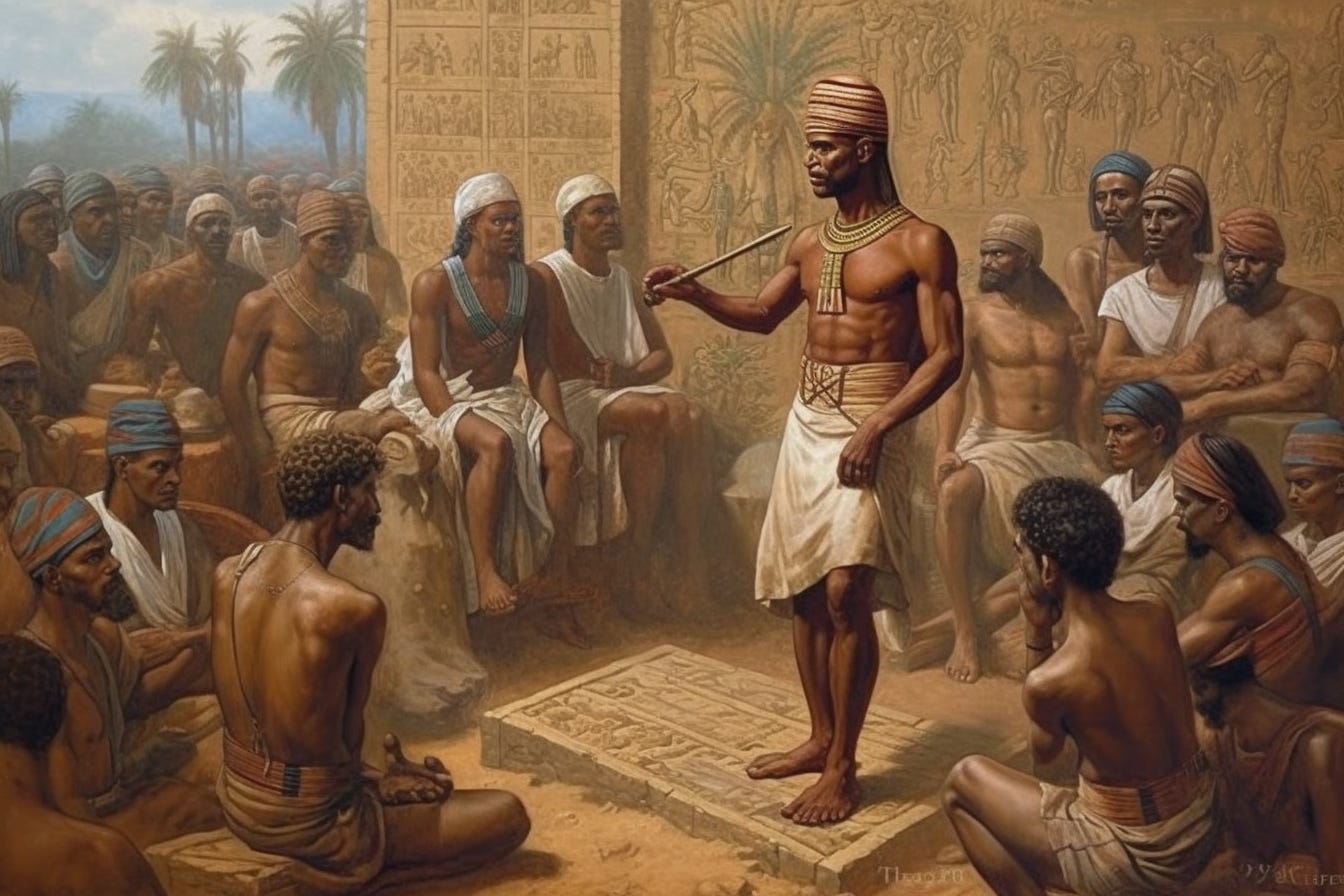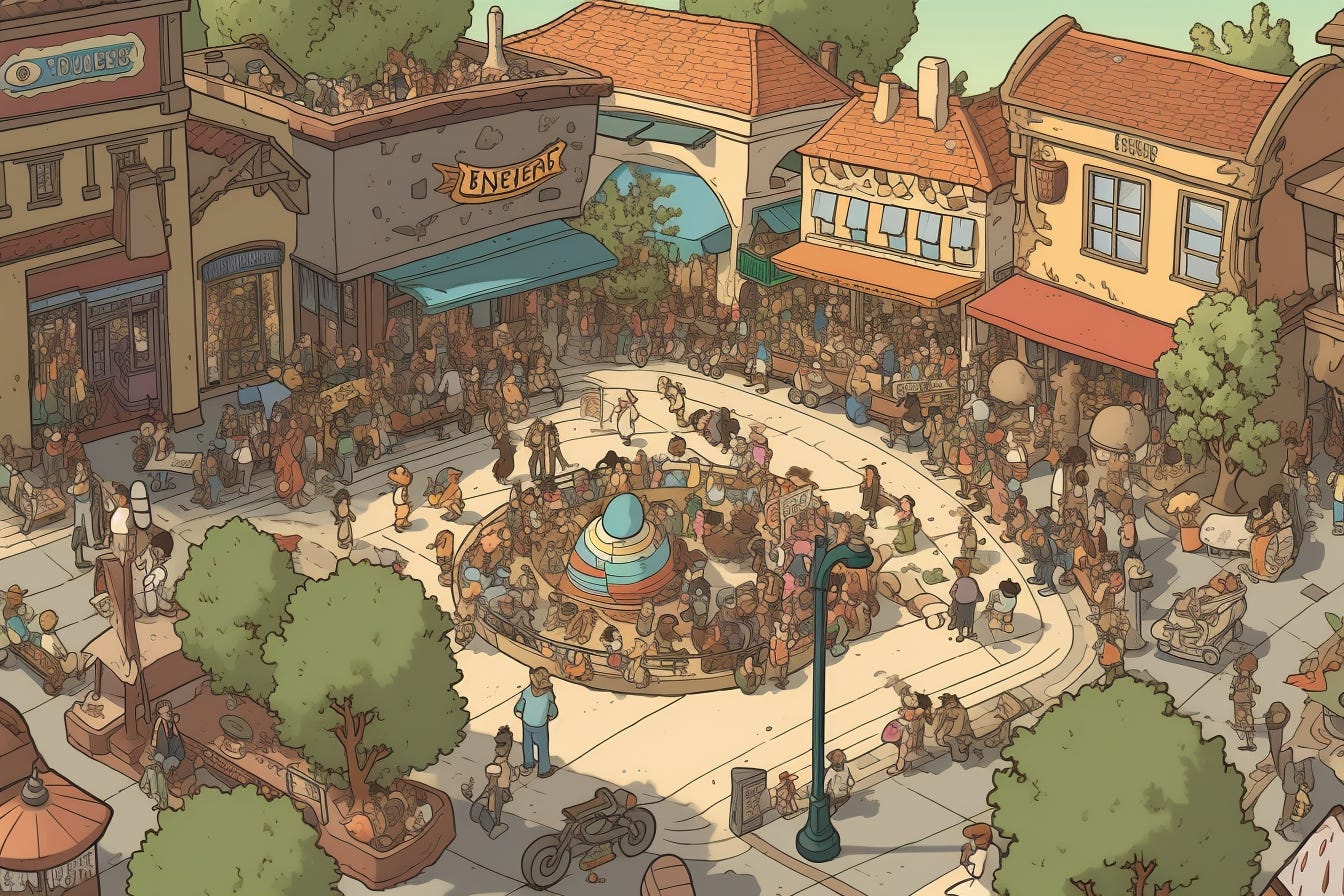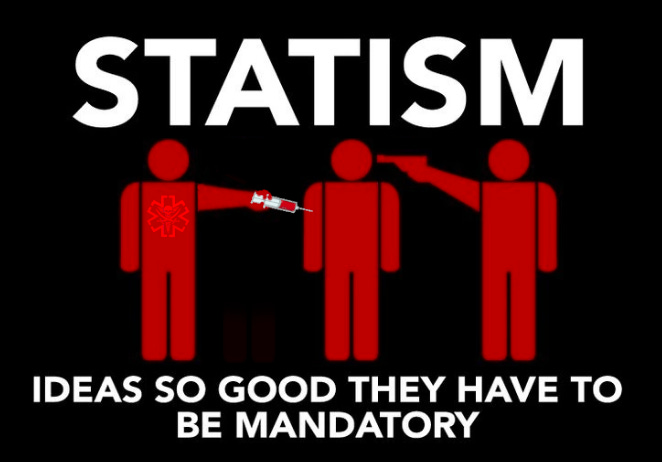Other Education Wars articles can be found here. Join the MetaPrep educational community.
"Honor and etiquette sound boring."
That's because you've been trained to think of it all wrong. Honor and etiquette are at the root of the struggle between freedom and totalitarianism. Correctly framed, they are technology that allowed for the scaling of healthy community. This should be more exciting than Connor McGregor joining Mel Gibson for one last battle against their oppressors. When the community remains whole, the children are far less likely to grow up hearing the story of how their fathers died in needless battles, and the production of wealth (along with health) generally supersedes entry into destructive games of conflict.
"Dude, I could learn that etiquette."
Rock onward.
"Does that mean we're going to learn how to destroy civilization?"
Hopefully it means we're going to learn how not to. Being able to live peaceably around more people has been a shining achievement of our species.
What is Etiquette, Anyhow?
Most people think of etiquette as rules for polite society.
"That's boring."
Hush already. If you're going to rule a kingdom one day, you're going to have to practice patience.
"I'll try."
That’s all I can ask.
The modern image that children receive is separate schooling for little girls to be raised as robotic wives who manage estates in polite society, or something like that. But the Victorian imagery is due to a historical breakdown of the connection between these rules and their purpose.
"Does that have something to do with the Kunlangeta?"
It very well might. Five points to Huffleclaw.
Certainly we are told that etiquette has something to do with ethical codes, but this was already extremely hard for children of my generation (the one called X) given how corrupt the world already seemed (which is nothing compared to the way it seems now). A phrase I heard a few times during childhood was, "Manners are minor morals." Yet, the people who practiced taught manners struck me as no more moral than anyone else outside the distilled madness of a ghetto. And those people often seemed too disconnected from society to take their views of morality particularly seriously.
Now, let's take a bit of a journey back in history to understand what etiquette was really about. Recall that, once upon a time, the Dunbar number was a sort of limitation on the size of functioning communities based on the social storage capacity of the human brain. However, economic competition raised up those societies that found ways to work productively in larger numbers. And nothing destroys wealth (the gains from productivity) like conflict. Various strategies allowed for the expansion of stable civilization to larger and larger "Dunbar circles" or "Dunbar rings".
Each new circle involved symbols, legal code, and even etiquette. That is, etiquette is the code of behavior necessary to maintain a large and thriving civilization, with resources left over to expand culture and the human experience.
"Boring!"
And yet, you're still here reading because that culture might as well be defined as everything we don't find boring: arts, science, travel, not dying in warfare, and collecting miniature spoons while traveling.
"Okay, you win. I'm done. Do you really collect miniature spoons?"
No.
Before moving on, let's soak up the first paragraph in Wikipedia's History of Etiquette, even if we might be virtually certain that etiquette goes back thousands, tens of thousands, or hundreds of thousands of years further:
In the third millennium BC, the Ancient Egyptian vizier Ptahhotep wrote The Maxims of Ptahhotep (2375–2350 BC), a didactic book of precepts extolling civil virtues, such as truthfulness, self-control, and kindness towards other people. Recurrent thematic motifs in the maxims include learning by listening to other people, being mindful of the imperfection of human knowledge, and that avoiding open conflict, whenever possible, should not be considered weakness. That the pursuit of justice should be foremost, yet acknowledged that, in human affairs, the command of a god ultimately prevails in all matters; thus some of Ptahhotep's maxims indicate a person's correct behaviours in the presence of great personages (political, military, religious). Instructions on how to choose the right master and how to serve him. Moreover, other maxims teach the correct way to be a leader through openness and kindness, and that greed is the base of all evil, and should be guarded against, and that generosity towards family and friends is praiseworthy.
Organization of Governance is Everything
Whether you are of an Abrahamic religion or not, the story of Exodus (18:13-27) includes one of the most important lessons of the technology of civilization,
13 The next day Moses sat to judge the people, and the people stood around Moses from morning till evening. 14 When Moses' father-in-law saw all that he was doing for the people, he said, “What is this that you are doing for the people? Why do you sit alone, and all the people stand around you from morning till evening?” 15 And Moses said to his father-in-law, “Because the people come to me to inquire of God; 16 when they have a dispute, they come to me and I decide between one person and another, and I make them know the statutes of God and his laws.” 17 Moses' father-in-law said to him, “What you are doing is not good. 18 You and the people with you will certainly wear yourselves out, for the thing is too heavy for you. You are not able to do it alone. 19 Now obey my voice; I will give you advice, and God be with you! You shall represent the people before God and bring their cases to God, 20 and you shall warn them about the statutes and the laws, and make them know the way in which they must walk and what they must do. 21 Moreover, look for able men from all the people, men who fear God, who are trustworthy and hate a bribe, and place such men over the people as chiefs of thousands, of hundreds, of fifties, and of tens. 22 And let them judge the people at all times. Every great matter they shall bring to you, but any small matter they shall decide themselves. So it will be easier for you, and they will bear the burden with you. 23 If you do this, God will direct you, you will be able to endure, and all this people also will go to their place in peace.”
24 So Moses listened to the voice of his father-in-law and did all that he had said. 25 Moses chose able men out of all Israel and made them heads over the people, chiefs of thousands, of hundreds, of fifties, and of tens. 26 And they judged the people at all times. Any hard case they brought to Moses, but any small matter they decided themselves. 27 Then Moses let his father-in-law depart, and he went away to his own country.
Never was there better father-in-law advice. To thrive, and maintain healthy equilibrium, the people needed to commit to handling their own affairs within the minimal Dunbar circle. Many leaders, not one. Decentralized, and as imperfect as the commitment of every community. This raised the stakes for everyone to commit to a life of rising spirituality.
It worked, and it can still work.
The Gaming of Honor
It is not simply the size of our civilization that matters to us. The structure matters as well. People want leaders and role models. And it's just not healthy for N-million people to look up to a single ruler. And what will they think when they find out how many times that leader flew on Jeffrey Epstein's plane?
Certainly, almost nobody ever grew up, statistically speaking, watching the king of the realm in order to learn how to handle their own affairs—and still have energy left over to lead and sometimes protect the others around them. Also, millions of people following one person does not last long. Instead, most people, historically speaking, looked to leaders closer to home—somebody like an elder or the chief of a tribe.
But "Chief" is not generally a title in modern civilization—at least outside of firehouses and police squads. And degrees of modernization brought with it specialization of various forms of leadership. Such specialization involved mazes of education and ritual obscured from others, and so they could be gamed. Once such a game begins, any corruption that passes becomes ossified in the operation of the kingdom. Thus began the life and worship of Moloch, which we might simply view as the embodiment of totalitarianism.
Even worse, in the technocratic civilization into which we have developed, the professional manipulators have abused scientific observed weaknesses of people in order to steer their behaviors. Chief among these, is the gaming of the chief:
Is this part of "the social media problem"? Are we keeping people in our tribe without geographic proximity, eschewing the benefits of local contact? Are we opening ourselves to programming by a combination of manipulators and artificial intelligence?
Yes.
And it's psychologically debilitating. The Mandarins believe they are entitled due to superiority, or hard work, or something like that. Yet, they work so hard to build a psychologically debilitating Matrix around the competition, and keep them from organizing—not as in organizing an army, but just organizing a community.
In place of community, we have social technologies that are accelerating a kind of mental deformation common to many people in society---perhaps so common that we now see some widely shared mental illnesses/illusions.
Indeed, there could not be a plandemonium without such psychological warfare tactics.
If all that isn't bad enough, many young people feel entirely helpless in the pursuit of leadership. This disincentivizes any commitment to a moral or spiritual life. The rise of Moloch is the destruction of community. And community is not simply a human technology, but perhaps a vital and irreplaceable component.
Titles and Totalitarianism
Much of this essay I've wanted to write for some time, but I was spurred by a conversation yesterday on Twitter. As a scientist, she lamented the struggle she faces over honorifics—and in particular the difference that a man might not face, falling back on "ms." from "dr."
Is there an element of sexism?
Almost surely, though the branching of female honorifics between "ms." and "mrs." is a guess outside of one's own community, and it has long been considered most polite to default to a woman's youthful beauty. Of course, this default bucks up against the trend of professionalization of women, and the honor owed to…any chief?
The exponential growth of capitalism put men at an advantage in the home, breaking a relative symmetry. Not finding the right solution to that problem, modernism gave way to feminist and then postmodernist backlash, and we will return to that point in a moment.
Who knows who the chiefs are when we pass them on the street? Or the lords, counts, barrons, priests, and grand poobahs at various steps of the hierarchies? Either we choose them for ourselves as a community, or they are themselves the key ingredient of totalitarianism: the Mandarin class that serves as makeup for the mafia and GANG-controlled society.
Over time, honorifics were endowed to state-sanctioned Mandarins regardless of whether they exercised leadership on a local level. Even worse, the divergence of wealth and class based on such titles severed the professional class from the working class, pushing the latter into a semi-ghettoized experience. Pushing back in any way, shape, or form results in stigmatization, legal problems, or worse. When a Chief passes by on the street, it is not they who is expected to lead, but to whom deference is owed. That inversion is the ante that sets the game theory in motion such that the rational way for nearly every member of society to play is to go along to get along.
This explains why the position of Chief is valuable enough to be the center of corruption. And it explains why so few Chiefs meet the expectations of their image. In the case of physicians, it means that we wound up with a medical class perfectly incompetent to treat science as an exercise in curiosity and judgment. Within their pools, they too look for a Chief to guide them most of the time. And so the hierarchical pyramid of society looks something like faux-Chiefs all the way down.
Just as postmodernism attacks modernism with economically backward demands on attention ("Let's play guess my pronoun!") that sacrifice the status of women, professional honorifics attack free society with limitless imposition. This is not the road to serfdom—this is serfdom.
Let us leave Science and all the branches of Philosophy out of this mess, to any extent that we can. Remember the story of Hasan ibn al-Haytham, and its lesson: science happens as a method, and in competition with authority. And the honor of being a scientist, professionally, is the honor of having the position of acting with enthusiastic curiosity…vocationally.
More importantly, to elevate Science beyond that ensures the continuation of the progression of technocratic totalitarianism. We certainly would not be where we are without it.















Well written, Matt. People are too easily played. The devil knows how to exploit vice.
Interesting stream of consciousness prose poem, Mathew; not sure what to make of it but Gertrude Himmelfarb's work on Victorian mores, manners and morals and Norbert Elias’s “The Civilizing Process” come to mind.
As a Voluntaryist, your meme “Statism: Ideas so good they have to be mandatory” was a pleasant surprise. Does this mean you are a Voluntaryist too? www.voluntaryist.com That would be a rare find on Substack.
Add this to your anti-Statist cache:
“Statism: the brilliant idea that we give a small group of people the right to kidnap, steal from, and kill us, so that we can be ‘protected’ from people who kidnap, steal from, and kill us.” Author Unknown
I cannot understand most of what you have written here. Can you translate this for me?:
“That's because you've been trained to think of it all wrong. Honor and etiquette are
at the root of the struggle between freedom and totalitarianism. Correctly framed,
they are technology that allowed for the scaling of healthy community.”
This seems to me mainly post-modern haze to amaze: concealing as revealing—palliative prose.
What central idea do you want me to understand here?
Thanks ahead for the clarification.
You seem concerned regarding war and children, so if you have not read Lloyd deMause and his Psychohistory gathering, I invite you to: www.psychohistory.com The title of his last book downloadable free on this website says it concisely: “The Origins of War in Child Abuse.” A series of his quotes that I hope will draw you to him:
“The history of childhood is a nightmare from which we have only recently begun to awaken. The further back in history one goes, the lower the level of child care. The source of most human violence and suffering has been a hidden children's holocaust throughout history, whereby billions of innocent human beings have been routinely murdered, bound, starved, raped, mutilated, battered, and tortured by their parents and other caregivers, so that they grow up as emotionally crippled adults and become vengeful time bombs who periodically restage their early traumas in sacrificial rites called wars. The evolution of the psyche is first of all accomplished by removing terrible abuses of children and their resulting developmental distortions, allowing the psyche to produce historical novelty and achieve its own inherent human growth path. Culture evolves through the increase of love and freedom for children. Can we afford not to teach parenting? What more important task can we devote our resources to? History is now a race between too slowly improving childrearing and too fast evolving destructive technology. The crucial task of future generations will be to raise loved children who grow up to be peaceful, rather than walking time bombs. Self-mastery must replace the mastery of others. Global suicide must not continue to be our goal.” Lloyd deMause
Keep safe and free.